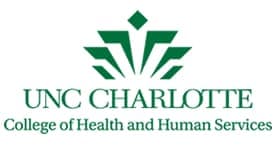Lecture, panel to celebrate School of Social Work designation

On Thursday, March 19, the College of Health and Human Services will mark the transition of the Department of Social Work into the new School of Social Work with a lecture and panel discussion.
N.C. Rep. Graig Meyer (District 50) will deliver keynote remarks at 5:30 p.m., March 19, in the Barnhardt Student Activity Center Salons. Discussion panelists will include Mecklenburg County Manager Dena Diorio; Mecklenburg County Chief District Court Judge Regan Miller; Rodney Sadler, associate professor of the Bible, Union Presbyterian Seminary, Charlotte; and Martha Whitecotton, senior vice president of Behavioral Health Services, Carolinas HealthCare System.
The talk and panel discussion will focus on the challenges that individuals, families and communities face in the state and nation; the role of social workers in various arenas to address these challenges, especially in light of the profession’s commitment to social and economic justice; and the challenges facing UNC Charlotte’s new School of Social Work.
Nancy Fey-Yensan, dean of the College of Health and Human Services, in commenting on the name change, stated, “This elevates our mission from one that focuses only on teaching into a school with graduate programs with the capacity to emphasize teaching and research. To be designated as a School of Social Work will enhance our ability to recruit research-oriented faculty, to acquire funding, to enroll top-quality and diverse undergraduate and graduate students and continue to secure vital field placements and instructors.”
According to U.S. News and World Report rankings, UNC Charlotte’s national ranking in social work was 82nd in 2008 and 66th in 2012, which was the second-highest ranked program in North Carolina after UNC Chapel Hill. According to the magazine, of the top 103 social work programs, 77 percent are schools of social work, while only 9 percent are departments of social work. Of the 65 programs ranked above UNC Charlotte, 98 percent are either schools or colleges of social work, while only 2 percent are departments.
There are no departments among the top 20 social work programs.
“We rank higher than all other social work programs in North Carolina with the exception of Chapel Hill,” said Fey-Yensan. “Our faculty are engaged in externally funded research that is founded on strong community connections. In both our academic offerings and in research, we are already operating at a level well above an average ‘department’ of social work.”